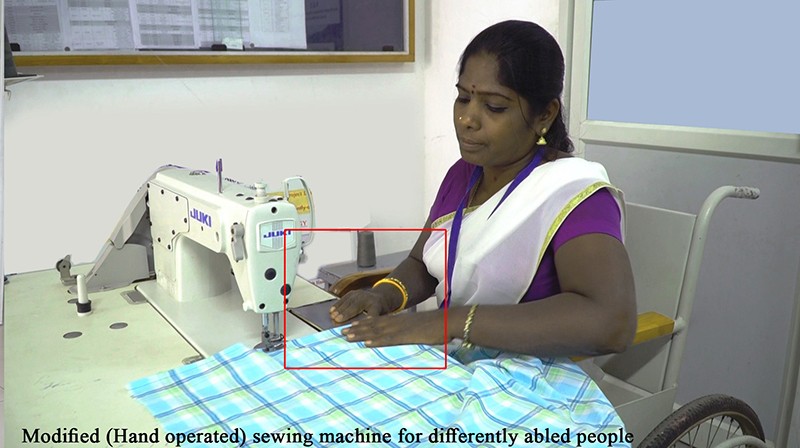 Sona College
Sona College’s sewing machines for the differently-abled have earned a third patent. Photo: By Special Arrangement
Sona College
Sona College’s sewing machines for the differently-abled have earned a third patent. Photo: By Special Arrangement
Sona Colleges sewing machines for differently-abled earn third patent
Salem: A quiet workshop to train rural women in garment-making in 2016 sparked a powerful idea that has since transformed lives.
Trainers at the Fashion Technology Department of Sona College of Technology noticed that some women with restricted lower-limb movement were unable to operate industrial sewing machines.
Yet, their determination to become independent inspired faculty members to find a way.
A four-member team—D. Raja, K. Mani, G. Gunasekaran and S. S. Suresh—rose to the challenge.
They reimagined the sewing machine’s foot pedal with assistive technology, enabling the entire operation through hand control.
The first prototypes were tested by rural women with locomotor disabilities, and the excitement spread quickly.
Three patented innovations
Haptic Glove Variant (2025), the latest breakthrough is a wearable glove that uses palm-pressure sensing to wirelessly activate the sewing machine motor.
It provides ergonomic comfort and stands as a symbol of inclusive design.
The Optical Sensor Variant, patented in 2024, recognises hand gestures to control the sewing machine.
It is hands-free, light-touch, and enhances both safety and adaptability.
The first in the series was the Load-Cell L-Plate Variant, patented in 2022.
It replaced the traditional foot pedal with a hand-press system.
For the first time, differently-abled women could sew independently and perform all standard industrial operations in a garment-making unit with ease and efficiency.
This innovation also opened the door for them to earn a steady income in garment-making units close to home.
Impact Beyond Innovation
In the past few years, over three hundred differently-abled women have been trained to use these patented machines.
For many, this has meant not just livelihoods in tailoring and garment production, but also a renewed sense of dignity and self-worth.
“These patents are not just about technology,” said Chocko Valliappa, Vice Chairman, Sona College of Technology, “they are about breaking barriers, creating opportunities, and showing that inclusion can be designed into everyday tools.”
The Tamil Nadu government has sponsored these patented eleven sewing machines for livelihood support for differently-abled women at a Sona College-run community centre in Maramangalathupatti, Salem district since 2023. Another three hundred women have been trained at the centre.
More women and welfare departments across India are expected to fund these innovative sewing machines as a livelihood support measure. At the same time, the Fashion Technology department is in active discussions with large sewing machine manufacturers for technology transfer, while students of the department are studying the project for further research and adoption by garment export firms.
The Fashion Technology teams continue to research many more innovations that promise to make the textile and garment industry more inclusive, affordable, and sustainable.
Sona College of Technology's Department of Fashion Technology has obtained eight patents in addition to achieving 17 consecutive years of 100 per cent placement for its graduating batches, with graduates securing jobs in scores of leading companies including Aditya Birla, H&M and Decathlon.
Top Headlines
-
News
CSR in the Crossfire: Professor and practitioners debate over ethics in India Inc. at Kolkata's MCHD talk
October 24, 2025
-
News
Jashanpreet Singh Case: California under fire for licensing undocumented truck driver
October 24, 2025
-
News
India upgrades Technical Mission in Kabul to Embassy, days after Muttaqi's visit to New Delhi
October 22, 2025
-
News
Pakistan, Afghanistan agree to 48-hour ceasefire after deadly border clashes
October 15, 2025
-
News
Afghan Taliban, Pakistan exchange gunfire, dozens killed
October 15, 2025
-
News
Trump hails Netanyahu in Israel after hostage release, declares historic dawn of a new Middle East
October 13, 2025
-
News
Historic dawn of a new Middle East: Donald Trump addresses Israeli Parliament
October 13, 2025
-
News
Shah Rukh Khan receives maiden National Award from President Droupadi Murmu
September 23, 2025
-
News
Kolkata: Ahiritola Yubak Brinda invites Auram to make jewellery for Ma Durga and her family
September 20, 2025
-
News
Israel-US alliance 'never been stronger', Netanyahu says as State Secretary Rubio visit for talks
September 15, 2025





